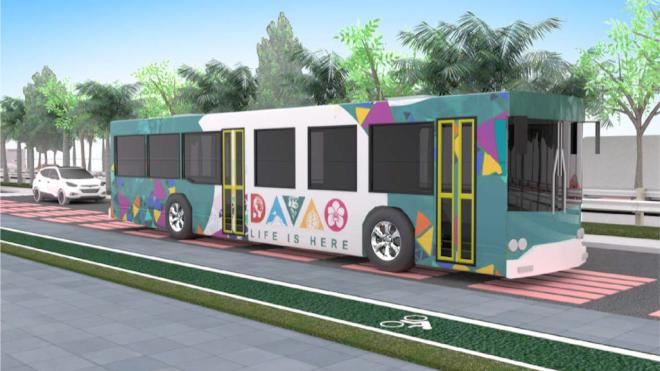
Davao City is upgrading its public transport to a smart system that will field a fleet of about 1,100 electric and Euro-5 standard diesel-fueled buses to serve commuters. Shifting to low-carbon vehicles is expected to reduce 60% of annual greenhouse gas emissions from public transport in the city, the country’s third largest by population.
The project, which is being funded by a $1-billion loan from the Asian Development Bank (ADB), is the first in the country to deploy electric bus fleets at a large scale in support of the Philippines’ efforts to reduce greenhouse gases.
In a news release, ADB said the Davao Public Transport Modernization Project is expected to serve as a pilot for overhauling the country’s public road transport system. The project is ADB’s largest road-based public transport project in the Philippines.
“The project is set to transform the quality of Davao City’s public transport and support the city’s rapid economic growth with a low-carbon and climate-resilient bus system,” said ADB Senior Transport Specialist Shuji Kimura. “Not only will this support the Philippines’ climate goals, but it will help to improve the lives of vulnerable populations, especially women and the young, who use public transport daily.”
According to the city government, while the bus project will be fully operational by end-2025, by end-2024 some of the buses will already be running.
Future-proofing the city
The bus project is a centerpiece of Davao City’s transport roadmap and central to its ambition of becoming a model city in the Philippines.
Davao City wants to future-proof its transport system as its population is estimated to top 2 million by 2028, according to the roadmap, which envisions a safe and sustainable transport system. In 2022, an estimated 80% of trips were made using public transport, highlighting the need for a modern bus system capable of supporting a growing population and their travel needs.
The modern bus system will service about 800,000 passengers per day. It also includes the construction of around 1,000 bus stops with bright lighting and shelters, five bus depots and three bus terminals, and provide bus driving training for the new system. It will upgrade the city’s public transport experience via an intelligent transport system that includes a bus location system, automatic fare collection systems, and Wi-Fi connectivity in buses, terminals, and depots.
The bus system is also envisioned to be easily accessible to older people, women, children, and people with disabilities. This means providing ramp access and services for people with special needs, including visually impaired individuals, at bus stops and buses; apps and software to access bus schedules and routes; and priority boarding and lanes, among others.
Social program for affected sectors
According to the city government’s website, the project will replace 7,000 public utility jeepneys in 29 routes across the city. A social development program will mitigate adverse impacts and risks related to the restructuring of the city’s transport sector. The assistance will include livelihood opportunities for affected public utility jeepney drivers, operators, and allied workers and their families.
Under the social packages announced in 2019, jeepney drivers will be trained and prioritized for employment when the new bus system is in place. They will be hired as regular workers, which will entitle them to social and health insurance. The packages also include educational assistance and cash-for-work assistance.
ADB is providing technical assistance of $1 million to support the Department of Transportation and the city government in developing staff capacities to oversee bus operations and overall project implementation.
ADB has provided project preparatory technical assistance since 2015 to help Davao City plan for the new bus system, including a capacity development program and a social development program. ADB’s Infrastructure Preparation and Innovation Facility supported the government in preparing the project, including identifying the location of facilities, on-site surveys, designs and specifications, consultation with stakeholders, and procurement support.
The ASEAN Infrastructure Fund is cofinancing the project with a $10-million loan under its ASEAN Catalytic Green Finance Facility (ACGF). The Green Climate Fund is providing a $50-million loan under the ACGF’s Green Recovery Program. Both facilities are administered by ADB.
In 2017, the Philippines launched a program to modernize the country’s public transport system to make it more efficient and reduce its greenhouse gas emissions. This entails adopting electric vehicles to replace jeepneys.
Across Southeast Asia, countries are shifting to electric vehicles to decarbonize the transport sector. ASEAN member states have put in place wide-ranging incentives to drive the adoption of electric vehicles as part of climate commitments as well as to attract investments in vehicle assembly and parts manufacturing.
This article was first published by BIMP-EAGA on 18 July 2023.

